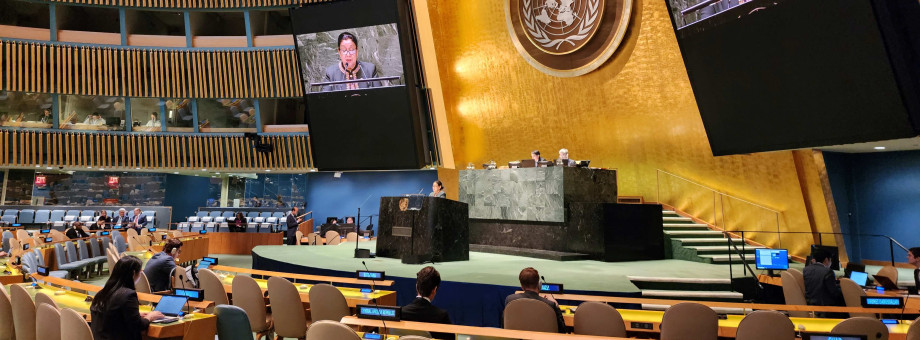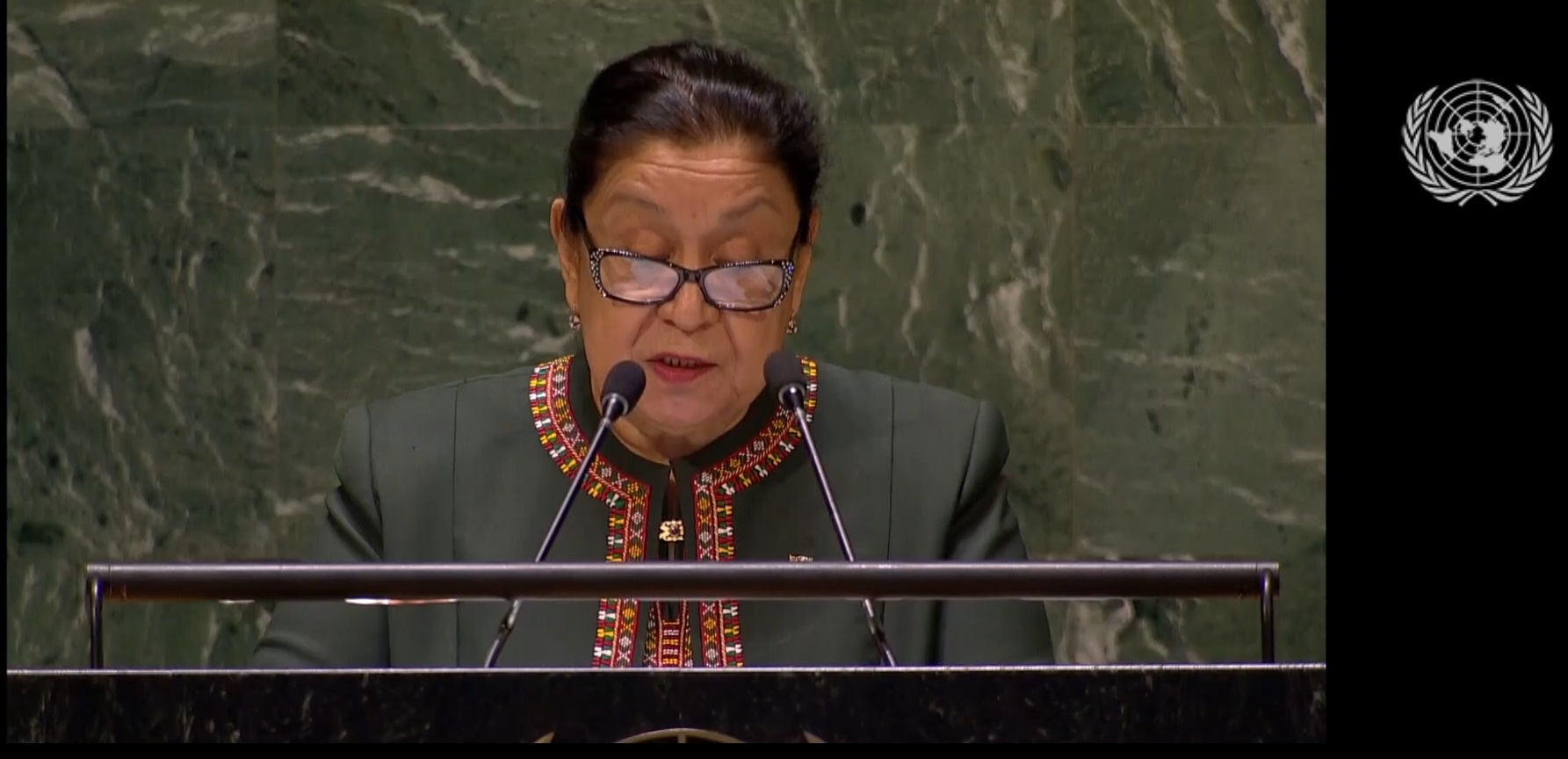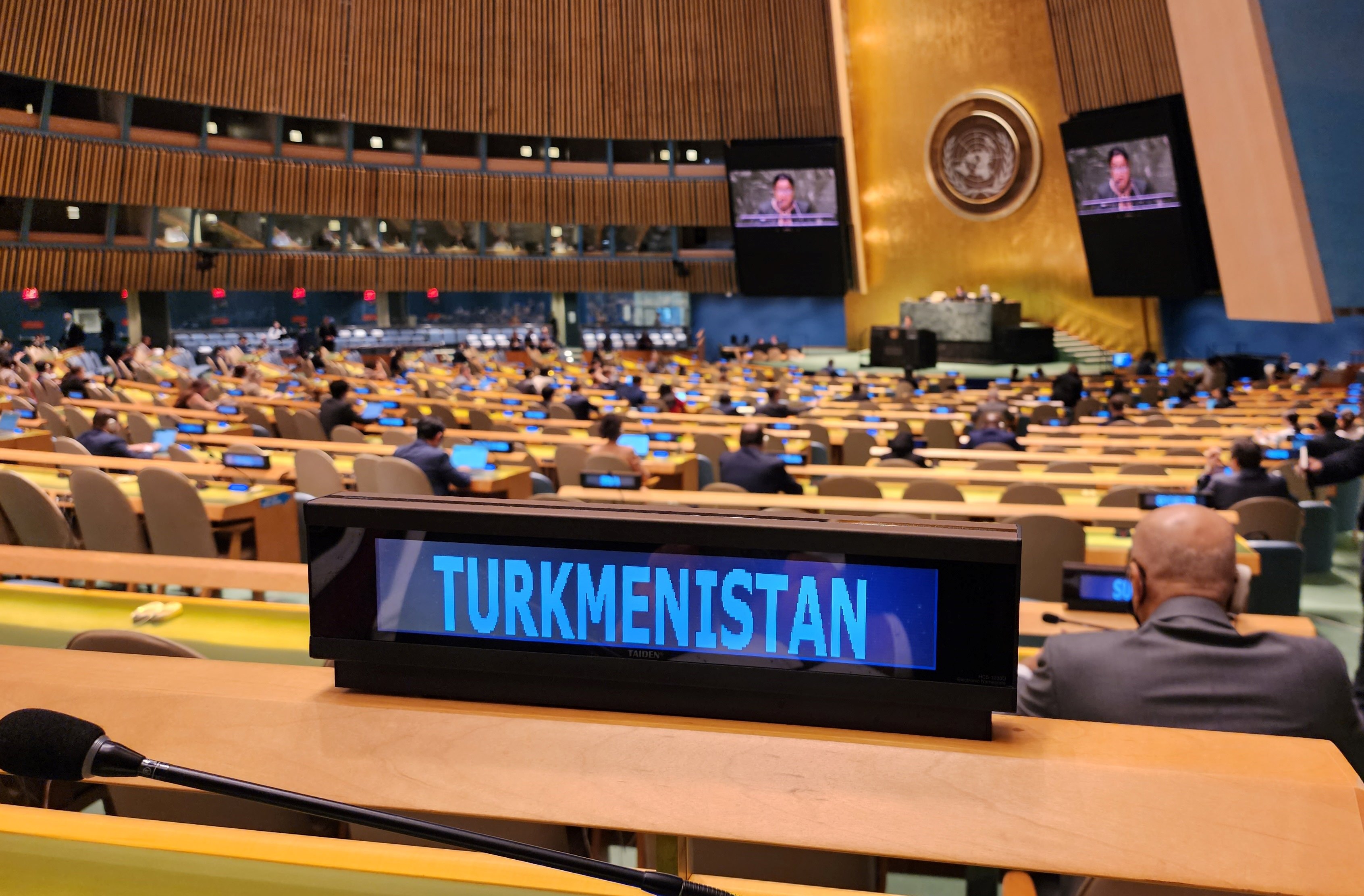Under the chairmanship of Turkmenistan, the United Nations General Assembly held a debate on the Zone of Peace, Trust and Cooperation in Central Asia

On May 16, 2023, the debate of the United Nations General Assembly initiated by Turkmenistan on agenda item 61 "Zone of Peace, Trust and Cooperation in Central Asia" was held.
 During the debate held under the chairmanship of Turkmenistan as Vice-President of the UN General Assembly, statements were made by the United Nations Member States.
During the debate held under the chairmanship of Turkmenistan as Vice-President of the UN General Assembly, statements were made by the United Nations Member States.
Emphasizing the importance of the adoption on July 28, 2022, of UN General Assembly resolution 76/299 on declaring Central Asia a Zone of Peace, Trust and Cooperation, the delegations touched upon the following issues:
- Strengthening security and stability. The current security challenges facing the region and ways to strengthen regional cooperation and coordination in combating emerging threats were outlined, including the role of the United Nations, in particular the UN Regional Center for Preventive Diplomacy for Central Asia, and other international and regional organizations in these processes;
- Ensuring economic and social development. The interdependence between political stability and sustainable economic development in relation to the concept of a zone of peace, as well as the progress made by the Central Asian states in achieving stable economic growth and social development, is considered. The potential for regional economic integration and trends in trade and economic cooperation was also noted;
- Environmental sustainability. Participants touched upon the region’s environmental issues, including water management and climate change. Ways to promote sustainable and green development in Central Asia, including using renewable energy sources and conserving natural resources, were considered.
The Permanent Representative of Turkmenistan to the UN, Ambassador Aksoltan Ataeva, in her statement (see below), expressing gratitude to the UN Member States for supporting the resolution of the General Assembly initiated by Turkmenistan and adopted in 2022 on the proclamation of the Zone of Peace, Trust and Cooperation of Central Asia, drew special attention to the need for further development of this zone as a legal phenomenon by analogy with internationally recognized and currently formed zones of peace in various regions of the world, in particular in the South Atlantic and the Indian Ocean.
 It was emphasized that the formation of a zone of peace in Central Asia became possible due to the institutional and legal framework for multilateral cooperation laid down by the countries of the region, namely, the creation of a mechanism of regular Consultative Meetings of the Heads of State of Central Asian countries, the signing of the Treaty on a Nuclear-Weapon-Free Zone in Central Asia in 2006, the establishment of the United Nations Regional Center for preventive diplomacy for Central Asia in December 2007, the creation on its basis of the Central Asia Women Leaders’ Caucus, the Academy of Preventive Diplomacy for youth and other platforms for promoting regional dialogue.
It was emphasized that the formation of a zone of peace in Central Asia became possible due to the institutional and legal framework for multilateral cooperation laid down by the countries of the region, namely, the creation of a mechanism of regular Consultative Meetings of the Heads of State of Central Asian countries, the signing of the Treaty on a Nuclear-Weapon-Free Zone in Central Asia in 2006, the establishment of the United Nations Regional Center for preventive diplomacy for Central Asia in December 2007, the creation on its basis of the Central Asia Women Leaders’ Caucus, the Academy of Preventive Diplomacy for youth and other platforms for promoting regional dialogue.
The high potential of cooperation between the countries of the region in the field of transport and energy, aimed at ensuring the interconnectedness of the interregional infrastructure of Central Asia, Europe, the Middle East, and the Asia-Pacific region, was underlined.
Emphasis was also placed on the key role of the Central Asian countries as neighboring states of Afghanistan in stepping up international efforts to stabilize this country, creating conditions for achieving national harmony through peaceful dialogue, contributing to international efforts to combat terrorism, and providing economic and humanitarian assistance to the people of Afghanistan.
CLICK TO SUBSCRIBE TO OUR NEWSLETTERS
STATEMENT
by H.E. Mrs. Aksoltan Ataeva
the Permanent Representative of Turkmenistan to the United Nations during the debate of the UN General Assembly on Agenda item "Zone of Peace, Trust and Cooperation in Central Asia"
(New York, May 16, 2023)
Excellencies
Ladies and gentlemen,
On July 28, 2022, the United Nations General Assembly adopted a historic resolution for the countries of Central Asia, declaring our region a Zone of Peace, Trust and Cooperation.
Let me express my sincere gratitude to the member states of the United Nations for their unanimous support of the resolution adopted at the initiative of Turkmenistan, especially to the countries that co-sponsored this important document.
Today we are taking the next, very important step in the formation and consolidation of the concept of the Zone of Peace in Central Asia, holding a debate on this topic for the first time in the General Assembly, in order to inform the world community about our obligations to maintain stability and security in a strategically important region of the planet.
Before proceeding to the discussion with a focus on the Central Asian region, I consider it necessary to draw your attention to the historical background and the global retrospective of the actions we are taking.
For many years now, humanity has associated with the United Nations the formation of a reliable mechanism for its security, the foundation for building a world based on mutual respect, trust, and the peaceful resolution of emerging contradictions on the basis of the principles of the UN Charter.
However, at this time, as in the past, we regret the relevance of Secretary-General Kofi Annan's words, and I quote: "Our political and institutional culture and practices remain much more focused on response than prevention".
The concept of international zones of peace opens up wide opportunities for us to implement what the distinguished Secretary General spoke about, namely, the creation of long-term security guarantees through preventive mechanisms, in particular, by forming "islands" of geopolitical stability enshrined in multilateral legal documents.
I am pleased to stress that, thanks to the efforts of a number of countries, our Organization has not stood still in the formation of such “islands” of peace and security.
Over the past few decades, both within and outside the UN system, a number of initiatives have been undertaken and implemented to establish zones of peace and cooperation in various parts of the world. In particular, multilateral political declarations and other international legal documents have been adopted concerning the establishment of zones of peace in such regions as the Mediterranean, South-East Asia, the Indian Ocean, the South Atlantic, and the South Pacific.
The current debate of the General Assembly is intended to remind the world community that zones of peace can and should be considered as a tool for maintaining and strengthening stability in key regions of the world from the point of view of global security, as an integral part of all the tools for the implementation of the preventive agenda, the early implementation of actions to prevent the growth of any military presence in these zones, and therefore the exclusion of the environment for the emergence and escalation of "hot" conflicts.
In this regard, the resolutions of the United Nations General Assembly on the declaration of zones of peace and cooperation in the South Atlantic of October 27, 1986 and in the Indian Ocean of December 16, 1971 have become significant steps in the international recognition and formation of the legal concept of zones of peace.
In this sense, the Central Asian states have followed the approaches and ideas formulated and implemented by our friends in Latin America and South Asia.
Excellencies,
Central Asia has historically been a region of concentration of geopolitical and geoeconomic interests of the main international actors. The states of our region, namely our brotherly countries - Kazakhstan, Kyrgyzstan, Tajikistan, Uzbekistan and Turkmenistan, which gained independence in the early 1990s, made significant progress in building their statehood, strengthening national economies and raising the standard of living of the population.
That is why in 2022, at the initiative of the President of Turkmenistan, emphasizing the importance of strengthening stability in Central Asia as an integral and key part of the modern system of international relations, our country outlined the key principles of maintaining peace and sustainable development in the region, taking into account the legitimate interests of all Central Asian states in UN General Assembly resolution 76/299, through which the territory of the Central Asian countries acquired international legal status as a zone of peace, trust and cooperation.
Looking one step ahead, I would like to emphasize that a natural and logical continuation of the development and design of the zone of peace in Central Asia as a legal phenomenon is the adoption of appropriate decisions within the framework of the existing mechanism of interaction between the countries of Central Asia at the highest political level, namely the Consultative Meetings of the Heads of State of the countries of the region, the last of which took place on July 21, 2022 in Kyrgyzstan.
In September 2006, the five Central Asian States signed the Treaty on a Nuclear-Weapon-Free Zone in Central Asia, which, together with assurances from the nuclear Powers, consolidated the nuclear-weapon-free status of the region and was an important step towards strengthening peace and security at the global level.
These decisions will be a natural continuation of the firm transition of our countries in interstate relations from a culture of reaction to a culture of early warning, the practical implementation of which since December 2007 has been successfully carried out by the United Nations Regional Center for Preventive Diplomacy for Central Asia, located in the capital of neutral Turkmenistan - the city of Ashgabat.
Today, the Regional Center, based on the methods of preventive diplomacy, makes an invaluable contribution to strengthening peace and stability in our region, consolidating our joint efforts on the peacebuilding agenda.
It should be noted that the process of integration, while building up confidence-building measures in our region, is distinguished by its consistency and consistency, annually replenished with extremely important institutions for development and conducting a multi-vector regional dialogue. As an example, I will cite the Central Asia Women Leaders’ Caucus, created in 2020 and demonstrating its effectiveness. It was the first platform of its kind in the region aimed at increasing the political, economic and social participation of women in interstate relations. We note with satisfaction that today the Central Asia Women Leaders’ Caucus has established contacts with such key structures of the United Nations system as the Peacebuilding Commission and the UN Department of Political and Peacebuilding Affairs.
It is also worth noting the Academy of Preventive Diplomacy to train young people in early warning and prevention tools, which was established by the UN Regional Center for Preventive Diplomacy and currently serves as the basis for the creation of a permanent Dialogue of Youth of Central Asian countries for peace in the region.
Ladies and gentlemen,
The preservation of peace is inextricably linked with socio-economic development, the promotion of economic, trade, cultural and humanitarian ties both at the regional and global levels.
For a short period of time, the countries of Central Asia, relying on its natural resources base and geographical advantages, have developed joint economic competencies and experience of interaction in both bilateral and multilateral formats in the field of energy, transport, logistics and communications, thus forming trade and economic integration corridors along the North-South line, East–West.
Today, the ambitious but realistic goal of turning Central Asia into an integral part of reviving Great Silk Road is being realized.
The cornerstone of these efforts is transport, logistics, the modern infrastructure that is currently being formed in our region, which ensures the interconnectivity of the transport systems of Central Asia, Europe, the Middle East, and the Asia-Pacific region.
In particular, projects for the development of transportation links along the Central Asia - Caspian Sea - Black Sea and Central Asia - Persian Gulf routes are being implemented at an accelerated pace.
The Central Asian region, possessing a huge energy resource potential, forms a reliable infrastructure in the heart of the Eurasian continent and guarantees of stable supply and transit of energy to the world's largest markets. Our common asset already includes a major energy project that has been implemented - the Turkmenistan-Uzbekistan-Kazakhstan-China gas pipeline. Work is underway with partners to increase energy supplies from Central Asia to Europe and expand their transit configuration.
In addition, Turkmenistan today is actively working on the implementation of the Turkmenistan-Afghanistan-Pakistan-India gas pipeline project. We would like to emphasize the importance of Afghanistan's participation in these and other multilateral projects, which is one of the key factors in restoring its economy and social sphere, and, ultimately, achieving sustainable peace and harmony in that country.
The countries of Central Asia, as neighboring states of Afghanistan, which have special historical ties with it, are key partners in building up international efforts to stabilize this country, create conditions for achieving national harmony through peaceful dialogue, promoting international efforts to combat terrorism, and providing economic and humanitarian assistance to the people of Afghanistan.
In this regard, the formation of a strong and predictable Zone of Peace, Trust and Cooperation in Central Asia is the key to solving a number of complex geopolitical contradictions in adjacent regions that the world community has not been able to overcome for many decades.
And finally, Central Asia, being one of the cradles of world civilization, forms a single cultural space in the region as a system of complex interaction between the cultural communities of our countries, popularization of the richest spiritual and historical heritage of the peoples of the region, modern achievements in the field of literature and art.
Ladies and gentlemen,
Turkmenistan, together with the countries of Central Asia, has prepared a concept and reference materials in the six official languages of the UN for the current debate of the General Assembly.
We express our sincere appreciation and respect to the delegations that responded to our invitation to participate in the debate, the main objectives of which, in our view, are:
- providing an opportunity for Member States to exchange views on maintaining peace and strengthening security in Central Asia and beyond;
- emphasize the importance of creating a Zone of Peace, Trust and Cooperation in Central Asia for the formation of a more stable international order based on the purposes and principles of the UN Charter;
- reaffirm the need to develop and strengthen internationally recognized zones of peace, proclaimed, among other things, by resolutions of the UN General Assembly in various regions of the world.
We look forward to a constructive and useful dialogue in the upcoming debates.
In conclusion, let me emphasize that the success of the Central Asian countries in maintaining and further strengthening stable and lasting peace in the region depends on the support of the international community, on the will of the United Nations Member States to ensure a peaceful and secure future for future generations.
I call on all countries to cooperate in joint efforts to form a strong and reliable Zone of Peace, Trust and Cooperation in Central Asia, respect for the national unity, sovereignty, independence and territorial integrity of all states of the Central Asia in strict compliance with the Charter of the United Nations.
Thank you for your attention!


 NEWS
NEWS